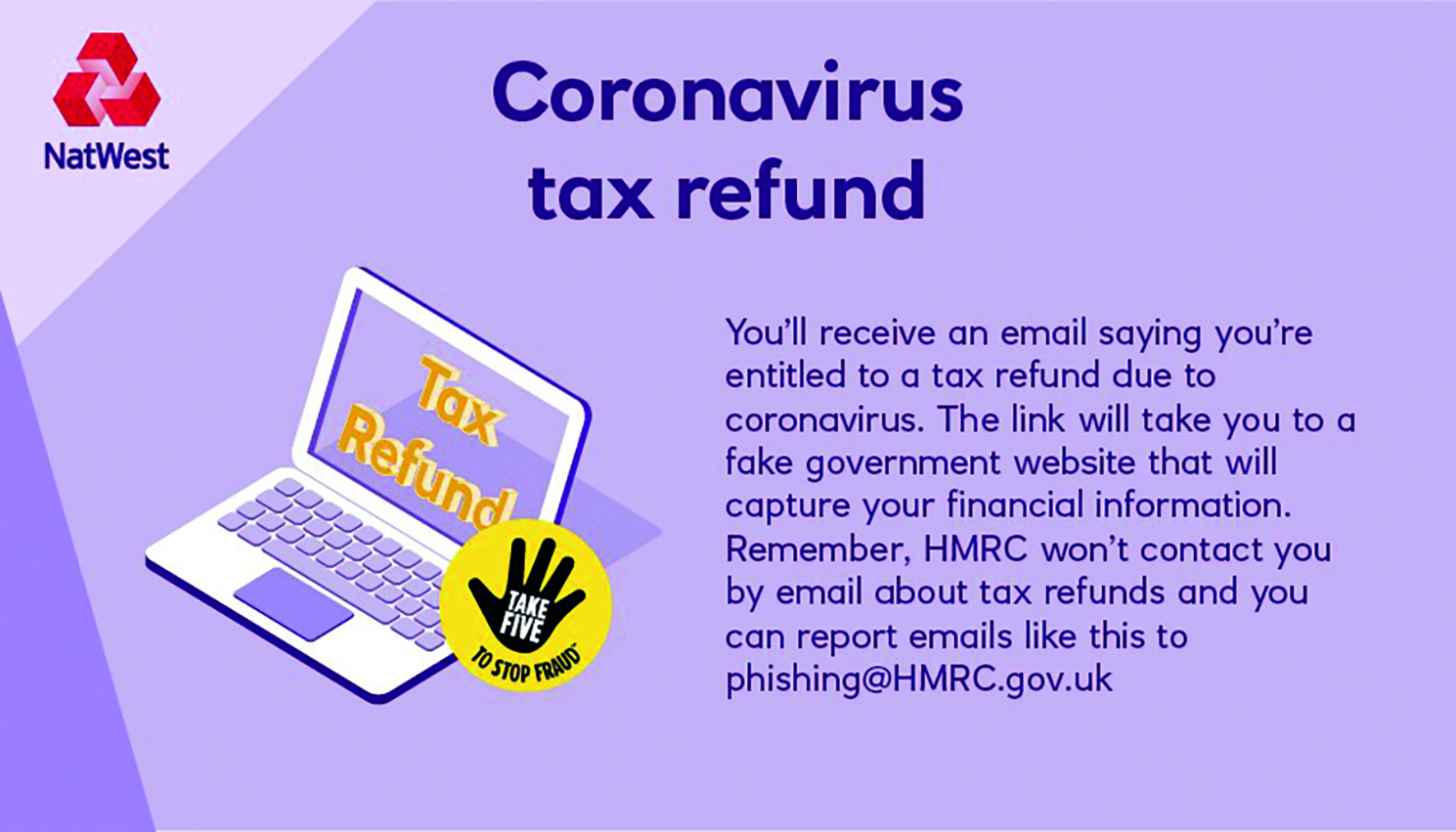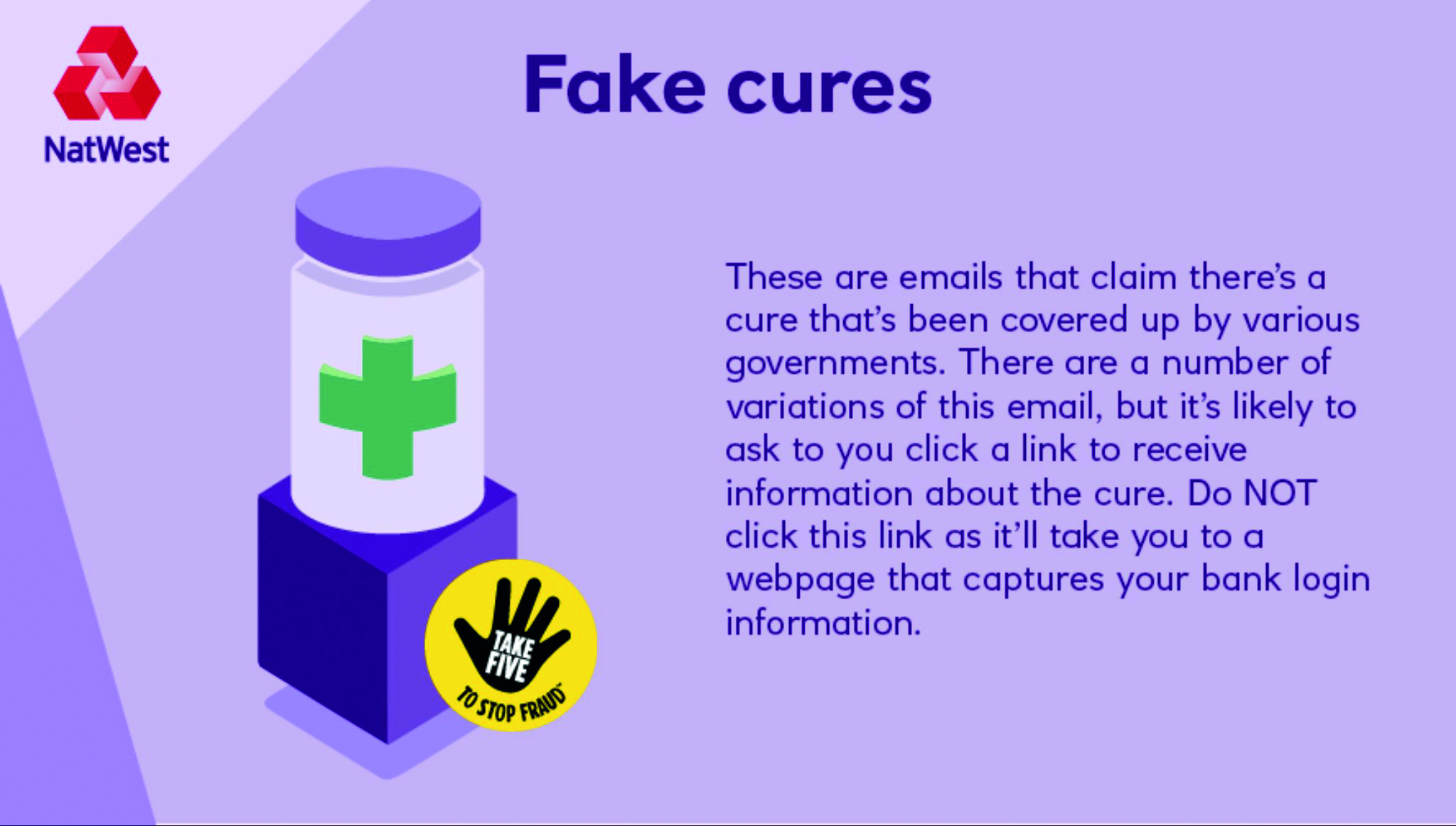According to Action Fraud, the COVID-19 lockdown over the past 12 months has seen an increase in scams of 400%.
By alerting Rotarians and the general public in advance by raising awareness of these types of scams, criminals will be less able to take advantage, even though lockdown measures are easing.
Vaccination scams are emerging as one of the top threats. A phone call, email or text message is sent in an attempt to steal personal and financial details.
The message contains a link to a fake NHS website with an application form to register for the vaccine asking for various personal and bank details which are then used by criminals.


According to Action Fraud, the COVID-19 lockdown over the past 12 months has seen an increase in scams of 400%.
Banks have issued tips to help stay safe and secure, as well as detailing five of the most common scams seen during lockdown.
You are now more likely to be a victim of fraud in the UK than any other crime.
During last year’s lockdown, criminals took advantage of more people working remotely and online. It therefore makes sense to take some simple steps to make yourself and your family more fraud proof.
Tips on how to become more fraud proof
Customers are reporting fake adverts on reputable sites such as Google, Facebook, eBay, and Instagram.
Try to shop online with websites that you know and trust using MasterCard or VISA.
If you see a deal online that looks too good to be true from a website you’ve never heard of, do your homework; check what the merchants refund policy is, do they have a landline to call if there is a problem, are there any negative reviews about them?


Banks have issued tips to help stay safe and secure, as well as detailing five of the most common scams seen during lockdown.
If you have doubts, don’t make the purchase.
If an online seller asks you to send money direct from your bank account to theirs, this is probably a scam.
If they fail to deliver the goods you will lose your money.
When it comes to buying online, use your MasterCard or VISA to pay, or carefully follow the scam advice on auction sites such as eBay and Gumtree will help you avoid falling victim
Don’t give away your personal and bank details too easily. Criminals use online competitions or offers of free shopping vouchers as a way of harvesting information from their next victims.
If you have doubts, don’t make the purchase.”
Be sceptical of unsolicited phone calls, texts or emails asking for personal or bank details. Your bank or the police will never ask for a full PIN or password, card reader codes, or ask you to move money from your account.
Do not recycle passwords and definitely use a unique password for your bank accounts and your email account.
Pass this information on to your family and friends, especially anyone you think might be vulnerable.
Current Scams
Postal delivery scams
With more shopping taking place online criminals have been using fake DPD and Royal Mail emails to collect personal information which they then use to commit further fraud.
Purchase scams
Criminals follow the trend and will offer goods for sale that are in high demand.
Our customers have reported scams involving pets that don’t exist, games consoles, mobile phones and even hot tub scams and camper vans. If you see a good deal advertised via auction sites or on social media be careful.
Follow the payment advice on the website, ideally pay by MasterCard or VISA and definitely do not pay direct into someone’s bank account until you have taken delivery of the goods.
Coronavirus Vaccination scams
A phone call, email or text message is sent in an attempt to steal personal and financial details. The message contains a link to a fake NHS website with an application form to register for the vaccine asking for various personal and bank details to ‘confirm your address’. This information is then used by criminals to target your bank account.


Coronavirus vaccine scams have become increasingly common.
Coronavirus tax refund
Criminals are bombarding inboxes with fake emails, texts and calls claiming entitlement to a support grant or tax-rebate due to coronavirus.
The aim is to get you to give them your personal details like your name, date of birth, address and sometimes even your payment card details, which they then use to steal your money.
Report emails like this to: report@phishing.gov.uk
Once criminals have your details, they will often call you, pretending to be from your bank’s fraud team, trying to persuade you to move your money to a ‘safe account’ or give away your card reader codes.
Offers to make quick money
There has been an increase in criminals trying to lure people into becoming money mules through ‘get rich quick’ job offers.
If someone offers you money to use your bank account refuse and alert the police.
The personal consequences of allowing criminals to pay money through your account can be life-changing and you may not be able to open a bank account again.
NatWest is also offering customers free Malwarebytes software to help with added online protection.
More information on how to avoid scams is available from:


























































